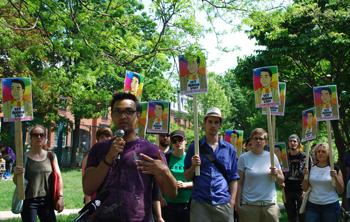UPDATE JUNE 1, 2PM: Alvaro Orozco was released from detention today, June 1, at roughly 10am.
“I feel shocked, but at the same time I feel excited and happy,” Orozco says. “A lot of people are happy.”
“It doesn’t get much shorter or sweeter than that,” said Richard Wazana, Orozco’s lawyer, as he stepped out of the detention review. Pending a successful medical exam, Orozco is officially free to begin the process of applying for permanent residence status.
“I’m very excited… I feel like I belong to somewhere. I belong to Canada now, so I feel safe,” says Orozco. “I feel like I have more rights, so that’s a nice feeling.”
Now that Orozco’s status is secure, he hopes to pursue his formal education. “I want to finish my high school education, and I want to go to college and get a certificate as a photographer and a certificate as a painter, but my main goal is to start studying to become an architect-designer,” he says.
Orozco says that while he didn’t feel safe in Nicaragua, he would still like to support the country he left when he was 12. “One of my goals, also, is to save money and to open a house in Nicaragua for kids who are on the street, and for kids who are gay but who live on the street or who are thrown out by their families,” he says.
In the past weeks, more than 1,500 people joined the Let Alvaro Stay movement on Facebook.
But Orozco’s journey is far from over, says his friend Suhail Abualsameed.
“There’s so much process around sorting out the technicalities” with regard to applying for healthcare and a work permit, for example, Abualsameed explains. “The system is not very easy to navigate.”
“He’s got big plans… he can’t do everything at once. This is not the end of the road where everything’s going to be oh-so-easy. There’s a lot of work yet to be done.”
***
UPDATE MAY 31, 5:30PM: After spending almost a month in a detention centre awaiting deportation, Alvaro Orozco will be able to stay in Canada, according to those close to him. The Nicaraguan-born gay artist was granted a stay on humanitarian and compassionate grounds May 31.
That means that Orozco can begin the process of becoming a permanent resident. And after that, he will be free to apply to become a Canadian citizen if he so chooses.
Orozco told Suhail Abualsameed this afternoon that he would have a detention review June 1, in which he would be informed of the approval of his application to stay in Canada.
“He couldn’t continue speaking,” Abualsameed remembers. “It’s overwhelming… it’s like a miracle.”
Abualsameed credits the application’s success to the activist presence that supported Orozco. “The work we’ve done… created an urgency within immigration to actually look at this application,” he says.
The news came after members of the queer and Latino communities held three demonstrations within the span of a single week.
Until news broke that his humanitarian application had been accepted, activists worried that he would be deported before his application was considered.
Orozco has not yet been released from the detention centre.
**
MAY 31, 2PM: Alvaro Orozco will remain in Canada for at least one more week. His deportation has been deferred until June 9, a move that some of his supporters suggest is a result of their vocal involvement with his case.
However, his humanitarian and compassionate grounds application remains in limbo, and no date has been set for that review.
News of the deferral was greated by cheers outside the 519 Church Street Community Centre, where about 30 people came to show their support for Orozco.
“This is showing a lot of power in our community right now,” says Craig Fortier, of No One Is Illegal –Toronto, at the outdoor rally May 31.
“We have no idea why that is, but we see it, obviously, as progress.”
But Ryan Hayes, a friend of Orozco’s, isn’t so sure.
“Knowing Immigration Canada, they can be very vicious… like sometimes, it’s just a red herring,” he says. “Other times, especially when people mobilize, sometimes they’ve sped up deportations.”
The fate of Orozco is in the hands of two different government departments. Deportation orders are handled by the Canada Border Services Agency (CBSA), but refugee claims — including Orozco’s application to remain in Canada on humanitarian grounds — are handled by Citizenship and Immigration Canada (CIC.)
As it stands, Orozco is likely to be deported by the CBSA before CIC hears his humanitarian appeal.
But Suhail Abualsameed says he’s spoken with Lucille Le Blanc, the director of the Ontario region of Immigration Canada; he says she’s suggested that the CBSA and CIC are communicating about the timeline of Orozco’s case.
“She looked at the file and she told me that ‘we are aware, they are talking to each other’…and then a couple hours after Alvaro called me and told me his deportation had been deferred,” Abualsameed says.
Calls to Le Blanc were not returned by press time.
But Abualsameed won’t speculate on whether Orozco’s review might be expedited in light of his date of removal. “That’s not saying they’re doing anything about it… I’m not saying that, because I don’t know.”
After the CBSA set a deportation date of June 2, Orozco’s lawyer, Richard Wazana, requested a deferral on May 27.
“And the deferral was a response to that request,” Abualsameed says. “We did hear from immigration that they are aware of the timeline [and…] they are in conversations with [CBSA.]”
That being said, the status of Orozco’s humanitarian and compassionate grounds application remains officially undetermined: “Nobody would give us that date.”


 Why you can trust Xtra
Why you can trust Xtra


